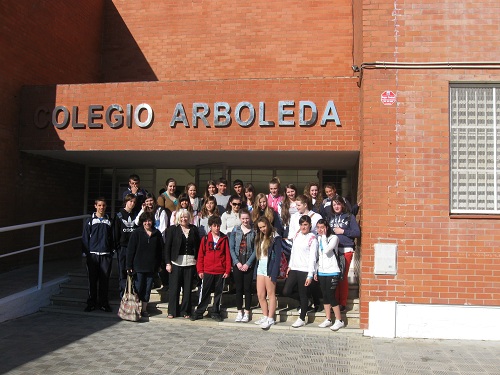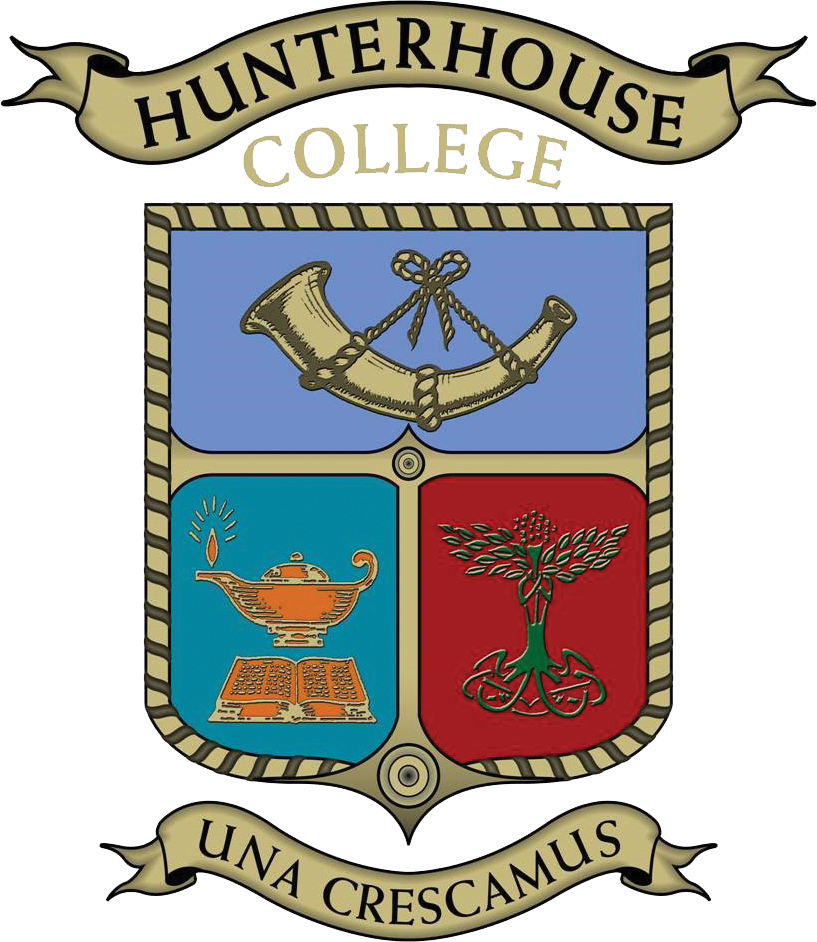Languages
French / German / Spanish
KS3
Hunterhouse College aims to foster interest and enthusiasm for language learning and to equip our students with linguistic skills that will serve them well in their future lives. We currently offer three languages- French, German and Spanish. Students in Year 8 follow a 10 week course in each language. They are assessed in one language before starting the next.
Students study two of these languages from the beginning of Year 9 until the end of Year 10.
KS4
Students may choose to study one or two languages at GCSE level
There are three contexts of learning:
a) Identity, Lifestyle and Culture
b) Local, National, International and Global Areas of Interest
c) School life, Studies and the World of Work.
The study of these themes builds upon all the topics, skills and capabilities that they have already covered at Key Stage 3 and focuses on developing practical communication in the four skills of listening, speaking, reading and writing.
A GCSE in a language helps students to:
- develop knowledge of and enthusiasm for language learning skills by providing opportunities for the practical use of the target language;
- develop the confidence to communicate effectively in the target language;
- develop transferable skills such as problem-solving, discussion, planning and time-management.
KS5
In Sixth Form, students continue to develop the four skills. They are introduced to the art of translation and study grammar points in greater depth. They study a literature text or a film in the target language and have conversation classes with the language assistant. The material studied at this level, while challenging and more demanding than material met at GCSE, should prove stimulating, leading to discussion (in the target language) on many issues of the contemporary world such as Relationships, Culture and Lifestyle, Young People in Society and Our Place in a Changing World.
European Day of Languages is celebrated each year on 26th September by having a special assembly. Students enjoy a hot drink and a pastry at Café Europe where they have the opportunity to say please and thank you in a language other than their own.
A weekly ‘Language Lounge’ is run by staff and sixth form mentors. Students can express themselves creatively through a variety of language-based activities including French Impressionist Art, German Christmas Carols and Spanish Carnival masks.
Over the past number of years, Senior Students have benefitted from exchange trips to Gymnasium Schloss Neuhaus in Paderborn, Germany and to Colegio Arboleda in Seville, Spain.
Key Stage 3 students have also enjoyed participating in the NICILT Francofest at Queen’s University Belfast.
Language Learning provides a fascinating insight into language and culture. Whilst developing the ability to communicate confidently and effectively in both speaking and writing, students also learn about the contemporary society, cultural background and heritage of the country.
The knowledge and advanced skills that students acquire will help them to progress to further study, higher education or employment and to take their place in a multilingual, global society.

French / German / Spanish
KS3
Hunterhouse College aims to foster interest and enthusiasm for language learning and to equip our students with linguistic skills that will serve them well in their future lives. We currently offer three languages- French, German and Spanish. Students in Year 8 follow a 10 week course in each language. They are assessed in one language before starting the next.
Students study two of these languages from the beginning of Year 9 until the end of Year 10.
KS4
Students may choose to study one or two languages at GCSE level
There are three contexts of learning:
a) Identity, Lifestyle and Culture
b) Local, National, International and Global Areas of Interest
c) School life, Studies and the World of Work.

The study of these themes builds upon all the topics, skills and capabilities that they have already covered at Key Stage 3 and focuses on developing practical communication in the four skills of listening, speaking, reading and writing.
A GCSE in a language helps students to:
- develop knowledge of and enthusiasm for language learning skills by providing opportunities for the practical use of the target language;
- develop the confidence to communicate effectively in the target language;
- develop transferable skills such as problem-solving, discussion, planning and time-management.
KS5
In Sixth Form, students continue to develop the four skills. They are introduced to the art of translation and study grammar points in greater depth. They study a literature text or a film in the target language and have conversation classes with the language assistant. The material studied at this level, while challenging and more demanding than material met at GCSE, should prove stimulating, leading to discussion (in the target language) on many issues of the contemporary world such as Relationships, Culture and Lifestyle, Young People in Society and Our Place in a Changing World.
European Day of Languages is celebrated each year on 26th September by having a special assembly. Students enjoy a hot drink and a pastry at Café Europe where they have the opportunity to say please and thank you in a language other than their own.
A weekly ‘Language Lounge’ is run by staff and sixth form mentors. Students can express themselves creatively through a variety of language-based activities including French Impressionist Art, German Christmas Carols and Spanish Carnival masks.
Over the past number of years, Senior Students have benefitted from exchange trips to Gymnasium Schloss Neuhaus in Paderborn, Germany and to Colegio Arboleda in Seville, Spain.
Key Stage 3 students have also enjoyed participating in the NICILT Francofest at Queen’s University Belfast.
Language Learning provides a fascinating insight into language and culture. Whilst developing the ability to communicate confidently and effectively in both speaking and writing, students also learn about the contemporary society, cultural background and heritage of the country.
The knowledge and advanced skills that students acquire will help them to progress to further study, higher education or employment and to take their place in a multilingual, global society.
